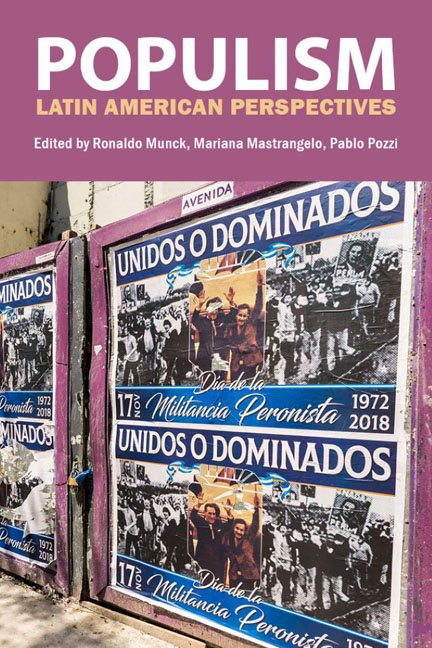Book contents
- Frontmatter
- Contents
- Abbreviations and acronyms
- Foreword
- Introduction
- 1 Populism in Latin America: development, democracy and social transformation
- 2 Peronism in Argentina: left or right?
- 3 The populist left in Chile: socialists and communists from 1936 to 1973
- 4 The left and the Workers’ Party in Brazil: a party between populism, social policies and the popular vote
- 5 Brazil, Bolsonaro and populism of the right
- 6 Political dilemmas of the government of López Obrador: between populism, democracy and the left in Mexico
- 7 The Bolivarian process in Venezuela: socialism, populism or neoliberalism?
- 8 Populist responses to crises of market democracy: the case of Bolivia’s Evo Morales
- 9 Ecuador: populism and the 2007– 17 political cycle
- 10 The Nicaraguan crisis and the mirage of left populism
- 11 Populism and the right in Latin America
- 12 Populism and the left in Latin America
- Afterword: a tale of two “people”: national popular and twenty-first-century Latin American populisms
- Contributors
- Index
6 - Political dilemmas of the government of López Obrador: between populism, democracy and the left in Mexico
Published online by Cambridge University Press: 23 January 2024
- Frontmatter
- Contents
- Abbreviations and acronyms
- Foreword
- Introduction
- 1 Populism in Latin America: development, democracy and social transformation
- 2 Peronism in Argentina: left or right?
- 3 The populist left in Chile: socialists and communists from 1936 to 1973
- 4 The left and the Workers’ Party in Brazil: a party between populism, social policies and the popular vote
- 5 Brazil, Bolsonaro and populism of the right
- 6 Political dilemmas of the government of López Obrador: between populism, democracy and the left in Mexico
- 7 The Bolivarian process in Venezuela: socialism, populism or neoliberalism?
- 8 Populist responses to crises of market democracy: the case of Bolivia’s Evo Morales
- 9 Ecuador: populism and the 2007– 17 political cycle
- 10 The Nicaraguan crisis and the mirage of left populism
- 11 Populism and the right in Latin America
- 12 Populism and the left in Latin America
- Afterword: a tale of two “people”: national popular and twenty-first-century Latin American populisms
- Contributors
- Index
Summary
INTRODUCTION
The notion of populism has had an uneven academic life. The variety of political movements to which the term is applied and the complex nature of the phenomenon itself, ranging from the left to the right of the ideological spectrum, has raised doubts about its plausibility […] Populism is not the first controversial issue in social science, nor is it surprising that the discussion about its semantic field is tinged with political connotations […] We scholars have not agreed yet about the forms in which the phenomenon manifests itself […] Since the seminal studies of the 1960s, it was not clear whether its ideological dimension (the populist ideas) or its organizational forms should be emphasized. (Maldonado 2017: 153– 4)
Talking about populism is fashionable nowadays. The term is enunciated in political debates, social networks and scholarly circles, and it is used interchangeably to praise or denigrate political figures of any ideological sign. Without going deeply into the intricacies of the term, its historical contexts and characteristics, maybe it is worth remembering that it first referred to late nineteenth-century social movements as different and distant as those of Russia and of the United States, whose only common traits were their closeness to “the people” and opposition to the established order.
The “populist wind” arrived in Latin America several years later. The names of Brazil's Getúlio Vargas and Argentina's Juan Domingo Perón remain in the collective memory and history. To them, we must add the most recent and abounding wave: Carlos Menem, Hugo Chávez, Néstor and Cristina Kirchner, Evo Morales and Rafael Correa, each in their own context. More recently, Andrés Manuel López Obrador has joined this list. If there is one thing these leaders have in common, it is their “personal style of governing”, as Daniel Cosío Villegas used to say.
The populist “rebirth” has been propelled by economic transformations: widening social and educational inequalities, those related to gender, race and access to public services; increasing poverty; various forms of violence; social exclusion and dysfunction; and biases of the democratic systems.
- Type
- Chapter
- Information
- PopulismLatin American Perspectives, pp. 103 - 120Publisher: Agenda PublishingPrint publication year: 2023

